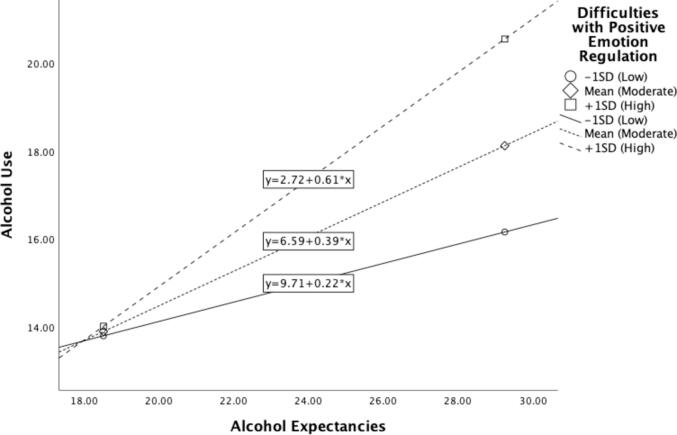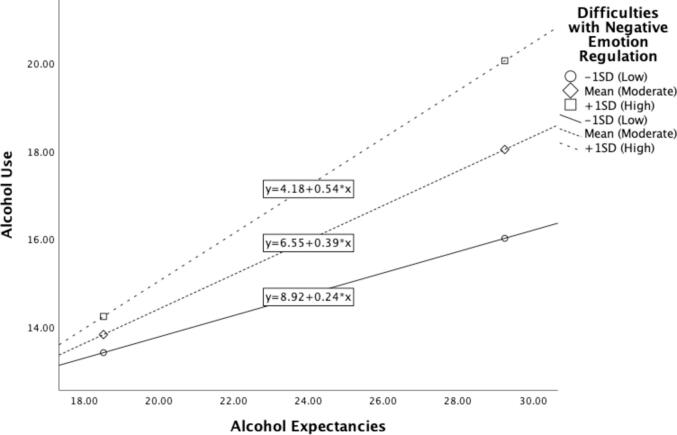大学生积极而非消极的情绪调节困难调节了积极酒精期望与酒精使用之间的关系。
IF 2.8
Q1 Psychology
引用次数: 0
摘要
背景:积极的酒精预期与大学生饮酒增加有关。调节情绪的困难已被证明可以缓和这种关系,尽管很少有研究说明基于被调节情绪的效价的差异。目的:探讨积极情绪失调和消极情绪失调在积极酒精期望与酒精使用之间的独立调节作用。方法:大学生(N = 165, Mage = 20.48, SDage = 1.90;66.1%女性;白色占66.7%;65.5%(非西班牙裔)报告有规律药物使用(过去一周≥3次)的患者完成了一次性调查。进行了适度的线性回归分析。结果:相关分析表明,积极的酒精预期、积极的情绪失调和消极的情绪失调与更多的酒精使用呈正相关。线性回归分析表明,积极情绪调节困难调节了积极酒精期望与酒精使用之间的关系。然而,负面情绪调节的困难并没有缓和这种关系。与那些报告更积极的酒精预期和更少的积极情绪调节困难的大学生相比,报告更积极的酒精预期和更大的积极情绪调节困难的大学生也报告了更多的酒精消费量。讨论:积极而非消极的情绪调节困难可能是大学生危险饮酒的一个危险因素。研究结果可能为修改大学咨询中心和其他卫生部门现有的干预计划提供信息,以促进积极情绪调节困难个体的积极情绪调节技能的发展,从而减少在这一高风险发展时期的危险酒精使用。本文章由计算机程序翻译,如有差异,请以英文原文为准。


Difficulties with positive, but not negative, emotion regulation moderate the association between positive alcohol expectancies and alcohol use in college students
Background
Positive alcohol expectancies are linked to increased alcohol use among college students. Difficulties regulating emotion have been shown to moderate this relationship, though little research accounts for differences based on the valence of the emotion being regulated.
Objective
To examine the independent moderating roles of positive and negative emotion dysregulation on the association between positive alcohol expectancies and alcohol use.
Methods
College students (N = 165, Mage = 20.48, SDage = 1.90; 66.1 % Female; 66.7 % White; 65.5 % non-Hispanic) who reported regular substance use (≥ 3 times in the past week) completed a one-time survey. Linear regression analyses with moderation were conducted.
Results
Correlational analyses suggested that positive alcohol expectancies, positive emotion dysregulation, and negative emotion dysregulation were positively associated with greater alcohol use. Linear regression analyses indicated that difficulties with positive emotion regulation moderated the relationship between positive alcohol expectancies and alcohol use. However, difficulties with negative emotion regulation did not moderate this relationship. College students who reported greater positive alcohol expectancies and concurrently greater difficulties with positive emotion regulation also report greater alcohol consumption, compared to those who reported greater positive alcohol expectancies and fewer difficulties regulating positive emotion.
Discussion
Difficulties with positive, not negative, emotion regulation may serve as a risk factor for hazardous alcohol use in college students. Findings may inform the modification of existing intervention programs across university counseling centers and other health sectors to promote the development of positive emotion regulation skills for individuals who endorse positive emotion regulation difficulties, thereby reducing hazardous alcohol use amid this high-risk developmental period.
求助全文
通过发布文献求助,成功后即可免费获取论文全文。
去求助
来源期刊

Addictive Behaviors Reports
Medicine-Psychiatry and Mental Health
CiteScore
6.80
自引率
0.00%
发文量
69
审稿时长
71 days
期刊介绍:
Addictive Behaviors Reports is an open-access and peer reviewed online-only journal offering an interdisciplinary forum for the publication of research in addictive behaviors. The journal accepts submissions that are scientifically sound on all forms of addictive behavior (alcohol, drugs, gambling, Internet, nicotine and technology) with a primary focus on behavioral and psychosocial research. The emphasis of the journal is primarily empirical. That is, sound experimental design combined with valid, reliable assessment and evaluation procedures are a requisite for acceptance. We are particularly interested in ''non-traditional'', innovative and empirically oriented research such as negative/null data papers, replication studies, case reports on novel treatments, and cross-cultural research. Studies that might encourage new lines of inquiry as well as scholarly commentaries on topical issues, systematic reviews, and mini reviews are also very much encouraged. We also welcome multimedia submissions that incorporate video or audio components to better display methodology or findings.
 求助内容:
求助内容: 应助结果提醒方式:
应助结果提醒方式:


